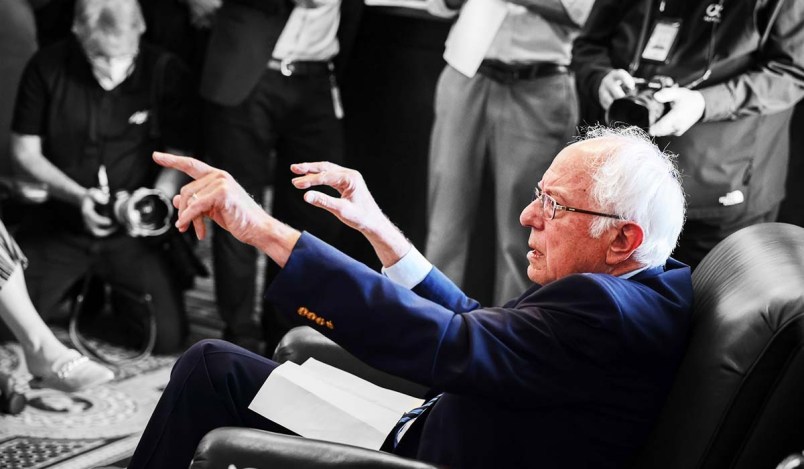In the last couple of weeks, Sen. Bernie Sanders (I-VT) has assumed a new role: spokesperson for the Democratic caucus’ frustration.
It’s an assignment the curmudgeonly lawmaker is well cut out for. He spends most of his public addresses and conversations with reporters railing against special interest groups, the creeping authoritarianism of the Republican party and the gaping holes in the social safety net that leave old people unhealthy, young people saddled with debt and children in poverty.
But recently, he’s turned his ire inward, at members of his own party.
Aggravation at the ideologically-unmoored obstinacy of Sens. Joe Manchin (D-WV) and Kyrsten Sinema (D-AZ) is plentiful within the caucus, but carefully meted out. It surfaces in subtle jabs — when Sen. Tim Kaine (D-VA) told reporters that most of the caucus prefers not to negotiate through the press, or when Sen. Mazie Hirono (D-HI) told TPM it’s hard to make reconciliation cuts until we know what “the two friends” are against or for.
Sanders is stomping on those eggshells. He’s been holding uncharacteristically formal events, including a full-fledged press conference on the Hill, demanding that Manchin and Sinema specify what they’ll support.
On Friday, when most senators had already high-tailed it out of town after a weeks-long melodrama over the debt ceiling, Sanders spoke with reporters in the Senate press gallery, making the moral case for the reconciliation bill — and reiterating his criticism of the two holdouts.
“My criticism of Senators Manchin and Sinema is not their views — they’re entitled to their views,” he said. “But my strong criticism is it is wrong when the American people, when the President of the United States, when 96 percent of your colleagues want to go forward, it is wrong to obstruct.”
He pointed to the deep stakes of the package, that some of his colleagues are trying to include policies that they’ve spent their entire careers working on: childcare, universal pre-K, affordable housing, homelessness, climate provisions.
“Any one of us can come forward and say, ‘you know what, if you don’t deal with homelessness in America, I’m not voting for this bill. If you don’t have the strongest possible climate provisions, I’m not voting for this bill,’” he said. “But what happens when you are part of a team, which is what a caucus is about, you have to compromise within ourselves.”
It’s the aggravation felt by his colleagues and many Democratic constituents alike, born of the unfortunate reality that a 50-person bare Senate majority vests individual lawmakers with enormous power.
The Democratic frustration has been steadily building all term, buttressed by Manchin and Sinema’s enduring support of the filibuster, which ensures that a massive swath of Democratic priorities will never become law. It reached a palpable crescendo last week, when the two’s refusal to negotiate reconciliation specifics set up a crisis situation where the bipartisan bill — the key to keeping centrists on board for the reconciliation vote — looked like it might pass alone and doom it’s much larger and progressive counterpart. House liberals refused to vote for the bill and saved the day, but the anger lingers.
And Sanders — gruff, dismissive of questions he doesn’t like, who had to yell “THAT WAS A JOKE” to clarify after cracking one to reporters — is a natural mouthpiece.
While congressional leaders and even the President tiptoe around the two senators, wary of angering them and hyper-conscious of the power they yield, Sanders has entered the scene to bring the heat and the scrutiny. His bad cop role will only become more important when the Senate returns in mid-October from a week-long recess, staring down a month and a half to get reconciliation done at last with the debt ceiling and government shutdown fights pushed to December.
“Is there a possibility — a horrible possibility — which would be so terrible for this country, that because two people refuse to do what 96 percent of the caucus wants, that nothing will happen?” Sanders mused, stricken, about the chance that Manchin and Sinema could derail reconciliation altogether. “There is that possibility.”



